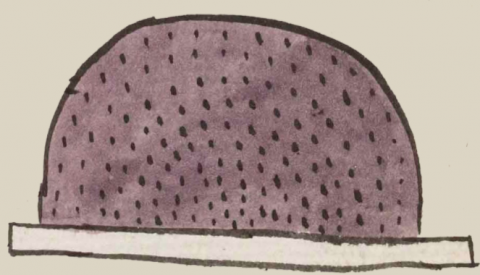tlatelli (Mdz19r)
This simplex glyph for tlatelli (a hillock or large mound of earth) also represents the place name, Tlatelolco. The half-circular mound is purple and dotted. There is a white, narrow, horizontal rectangular base underneath the mound.
Stephanie Wood
Given the presence of a base, this mound could be a visual reference to what we might call a pyramid, a constructed mound, which would have had a religious use and significance. The presence of the sand (xalli), shown here as dotted, which makes up the hillock, may substantiate Rémi Siméon's suggestion that Xaltilolco was the original name for the city. See: Tetlacuilolli. Interestingly, the glyph for Tlatelolco in the Codex Telleriano-Rememsis, folio 33 verso, takes the shape of a tepetl), but it is also colored purple. The texturing there, in lieu of dots for sand, are "u" shapes that are reminiscent of the texturing of tlal(li). See: Gordon Whittaker, Deciphering Aztec Hieroglyphs (2021), 25, figure 1.8.b. Tlatelolco was a major center near Mexico-Tenochtitlan, on the north shore of the lake, and famous for its large open-air market. Ruins of large temple-pyramids are still very visible in the center of Tlatelolco today.
Stephanie Wood
c. 1541, but by 1553 at the latest
Stephanie Wood
hillocks, mounds, mogotes, cerros, pyramids, montículos, pirámides

tlatel(li), large mound, https://nahuatl.wired-humanities.org/content/tlatelli
tlatil(li), large mound, https://nahuatl.wired-humanities.org/content/tlatilli
altozano o montón de tierra grande
Alonso de Molina
Codex Mendoza, folio 19 recto, https://digital.bodleian.ox.ac.uk/objects/2fea788e-2aa2-4f08-b6d9-648c00..., image 48 of 188.
Original manuscript is held by the Bodleian Libraries, University of Oxford, MS. Arch. Selden. A. 1; used here with the UK Creative Commons, “Attribution-NonCommercial-ShareAlike 3.0 License” (CC-BY-NC-SA 3.0)
